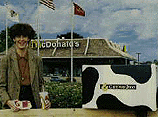So began the introduction of a joint marketing venture between Gateway2000 and McDonald's. Gateway, an IBM/Wintel clone-maker has long used images of cows in its corporate dealings; Gateway systems are even shipped in boxes mottled black and white -- like the Holstein cows that Gateway was financed upon.
This is, however, the first time Gateway has used dead cows in their ads. Ironically, the ads were published within days of an internationally coordinated anti-McDonald's campaign, which was partially organized via computers on the Internet.
"It takes a meaty computer to keep track of all those burgers"
 Inside the poster a McDonald's VP is shown holding the poorly-received Arch Deluxe sandwich
next to a Gateway cow-box. The box and sandwich are propped on a fence
similar to those used on livestock farms. Taken at the corporate
restaurant in Naperville, Illinois, the photo incorporates picture-perfect
blue skies, and lush vegetation.
Inside the poster a McDonald's VP is shown holding the poorly-received Arch Deluxe sandwich
next to a Gateway cow-box. The box and sandwich are propped on a fence
similar to those used on livestock farms. Taken at the corporate
restaurant in Naperville, Illinois, the photo incorporates picture-perfect
blue skies, and lush vegetation.
In bold, inch-tall letters, the ads blare, "Beefed-up Computing ... It takes a meaty computer to keep track of all those burgers. That's why McDonald's chose Gateway. In hundreds of corporate-owned restaurants across the country, a custom- built GATEWAY PC keeps track of everything, from how many fries are sold to who's working the drive-through."
Ann Appleseth, of Gateway2000 marketing, said Gateway was aware of the McLibel issue but felt no need to steer clear. Appleseth said that Gateway wanted to feature "major accounts" for whom Gateway had done special integration.
When asked about the placement of the Archway Deluxe next to the "cow-box," and whether it would cause associations not generally desired by the meat industry, Appleseth said that the cow-skin motif has always been part of "our branding." Even the big, modern, main building at Gateway is painted like a cow. Waitt's own office is completely decorated in the black and white cow motif.
Gateway Founder and CEO Ted Waitt designed their early ads himself, and little of Gateway's good ol' boy style has changed since the company started nine years ago, in a red barn on the Waitt family's cattle ranch. Popular legend states that Gateway was capitalized by his father's cattle-ranching fortune. Waitt denies this is directly true, instead giving his own cattle-ranching operation credit for funding the Gateway startup. Waitt also admits that the name for his company was, in part, given to him by a drinking buddy in a bar.
"Hey Bill! Throw another burger on for me! And crank up some ZZ Top!"
The female phone-DJ reminds listeners that at Gateway, staff dresses casual, like when they have their Saturday-evening barbecues. She yells ,"Hey Bill! Throw another burger on for me! And crank up some ZZ Top!" After the end of "Sharp Dressed Man" (in leather, no doubt), the theme from "Rawhide" plays "..don't try to understand 'em, Just throw the rope and brand 'em." Ms. phone-DJ explains there are over four million "head of cattle" in Gateway's home state of South Dakota, and that humans are "outnumbered by 6 to 1." While the theme from "Green Acres" plays, the announcer tells callers that each of the Waitt family dairy cows produce 256 glasses of milk a day. Nothing is said about veal.
No small wonder then, that a man who sees animals only as production machines would house his computers and workers in structures which look like cow-skin. And it's not a great leap to see why such a man would embrace product-shots for McDonald's. He stands to make money both ways, promoting his computers and his meat.
As technology becomes more pivotal in daily life, will animal groups that target companies like GM and Gillette eventually start making warning-stickers that say "This Computer Was Built with Blood Money?"
Gateway's hold-music selection has inadvertantly opened the door for groups such as PETA to get more plausibly involved, and pack celebrity firepower to boot. While the phone-DJ waxes about a technological global "revolution" as the Beatle's classic "Revolution" spins up.
It's doubtful that Paul McCartney would be happy to see Beatles music used by the likes of Gateway. Years earlier, Paul and wife Linda launched a vegetarian line of foods. More recently, McCartney left voice-mail messages to hundreds of Gillette employees regarding the company's product-testing on animals. Only a week before the Gateway ads, McCartney and PETA placed a spurious fur ad in the New Yorker magazine designed to help respondents to the ad "save thousands" on fur. Callers got to hear McCartney, and were sent a video detailing how boycotting fur would save thousands "of animal lives."
The Good, the bad, and the boy-cow-tted
Perhaps the most notorious was AMD's Microsoft-approved ad for the Am486 chip, which showed an Am486, a slab of meat, cheese and a leather purse. The ad presented the MS-Windows seal on the Am486 as analagous to the "USDA Choice," "REAL" (Dairy) and 'Genuine Leather' sticker on the other products, signifying "Standards of Excellence."
The only other computer advert to evoke such strong reaction, was Apple's Earth Day ads, which extolled the virtues of animal experimentation. This, after getting complaints and threats of boycotts from bio-med interests over Apple's use of Jennifer Graham in commercials. Apple then abruptly dumped Graham's commercials, and the subsequent pro-vivisection print ads were seen as an attempt woo the bio-med market back to Macs.
